Yelp Local Economic Impact Report: A Look at Diverse Businesses
April 2021
For the Diverse Business Report, we’re using a new methodology that tracks several indicators on a daily basis. For more on the methodology for this report, click here.
Throughout the course of the pandemic, millions of businesses have been impacted by public health restrictions and economic uncertainty. Unfortunately, businesses owned by people in underserved communities have been disproportionately impacted. Yet, these diverse businesses are critical to the recovery of local economies.
On Yelp, business owners can choose to display identity attributes, such as Black-owned, Women-owned and Latinx-owned, which increases awareness of businesses owned by these underserved individuals. Consumers can then easily search for and discover businesses that have indicated these attributes – aligning their spending habits with their values. To expand on the currently available identity attributes, today, Yelp is launching an Asian-owned attribute in partnership with Gold House, a non-profit organization that forges the inclusive unity, representation, and success of Asians and Pacific Islanders. In the future, once the Asian-owned attribute is more broadly adopted, we will be able to expand on this report with data that shows how consumers are interacting with Asian-owned businesses on Yelp.
Despite the challenges that face these underserved communities of business owners, Yelp data reveals how women, Black, and Latinx business owners across the nation have persevered. Based on these identity attributes, these diverse businesses are more likely to endure closing and reopening more than once compared to businesses overall. Yet many of them have survived, as Yelp data also shows that consumers are increasingly looking to support Black, Latinx, Asian and women business owners. In addition, women, Black, and Latinx-owned businesses are more likely to have higher ratings and reviews on Yelp, as well as a higher rate of community engagement through review responses compared to all businesses.
Underserved Business Owners Show Resilience During the Pandemic Compared to Peers — Reopening Multiple Times
Women, Black, and Latinx business owners have shown tremendous resilience during the pandemic. Among businesses that were open at the start of the pandemic and that closed and reopened at least once, roughly 29% of businesses owned by women, Black people, and Latinx people reopened twice or more — notably higher than the share among other businesses.
Underserved Business Owners Showed Resilience
Women, Black and Latinx business owners were more likely to endure multiple reopenings during the pandemic

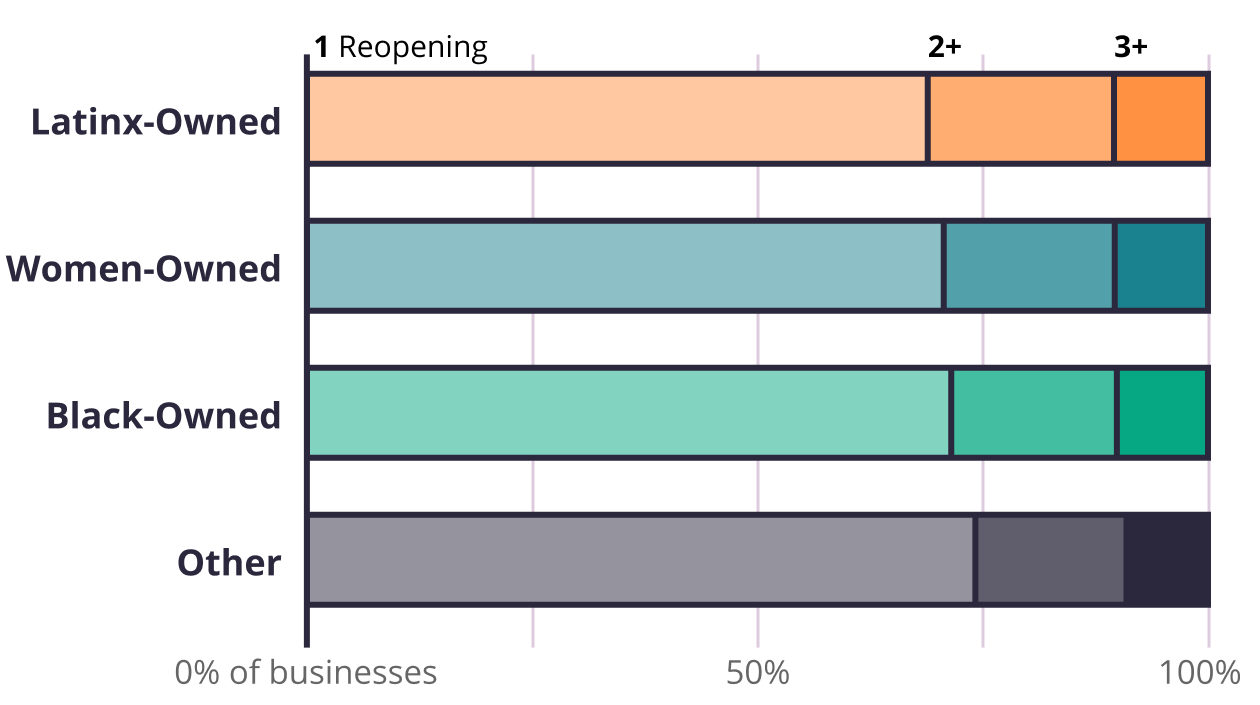

More than 20,000 businesses owned by women that were open at the start of the pandemic have closed and reopened at least once (10% of the total), and 29% of those — more than 6,000 — have reopened twice or more. More than 1,300 Black-owned businesses (12%) have closed and reopened with 28% of those — nearly 400 businesses — reopening twice or more; and more than 1,200 Latinx-owned businesses (13%) have closed and reopened at least once, with 31% of those — more than 300 — twice or more.
The women-owned businesses that reopened spanned more than 1,000 categories, including more than 7,000 beauty businesses, nearly 4,000 restaurants, and nearly 3,000 healthcare businesses. Reopenings of Black-owned businesses included those in more than 500 categories, among them nearly 500 beauty businesses and more than 300 restaurants. Latinx-owned businesses reopened in nearly 500 categories, including nearly 500 restaurants and more than 300 beauty businesses.
Consumer Interest In Diverse Businesses Increases As Awareness Grows
People across the nation have come together to reject racism, sexism and oppression that has plagued our country for centuries. Yelp data shows that consumer desire to support Black, Latinx, Asian and women business owners surged during the pandemic in light of the devastating impacts on underserved communities.
The rate of searches on Yelp for women-owned businesses in the U.S. increased by 264%, for Black-owned businesses it increased by 3,085%, for Latinx-owned businesses it jumped by 4,077%, and for Asian-owned businesses it increased by 3,404%*, in February 2021 compared to the same period the year prior. Overall, searches for all women, Black, Asian and Latinx-owned businesses, as a share of all U.S. searches, were up 2,930% in February year-over-year (YoY).
Searches for Asian, Women, Black and Latinx-Owned Businesses Surge

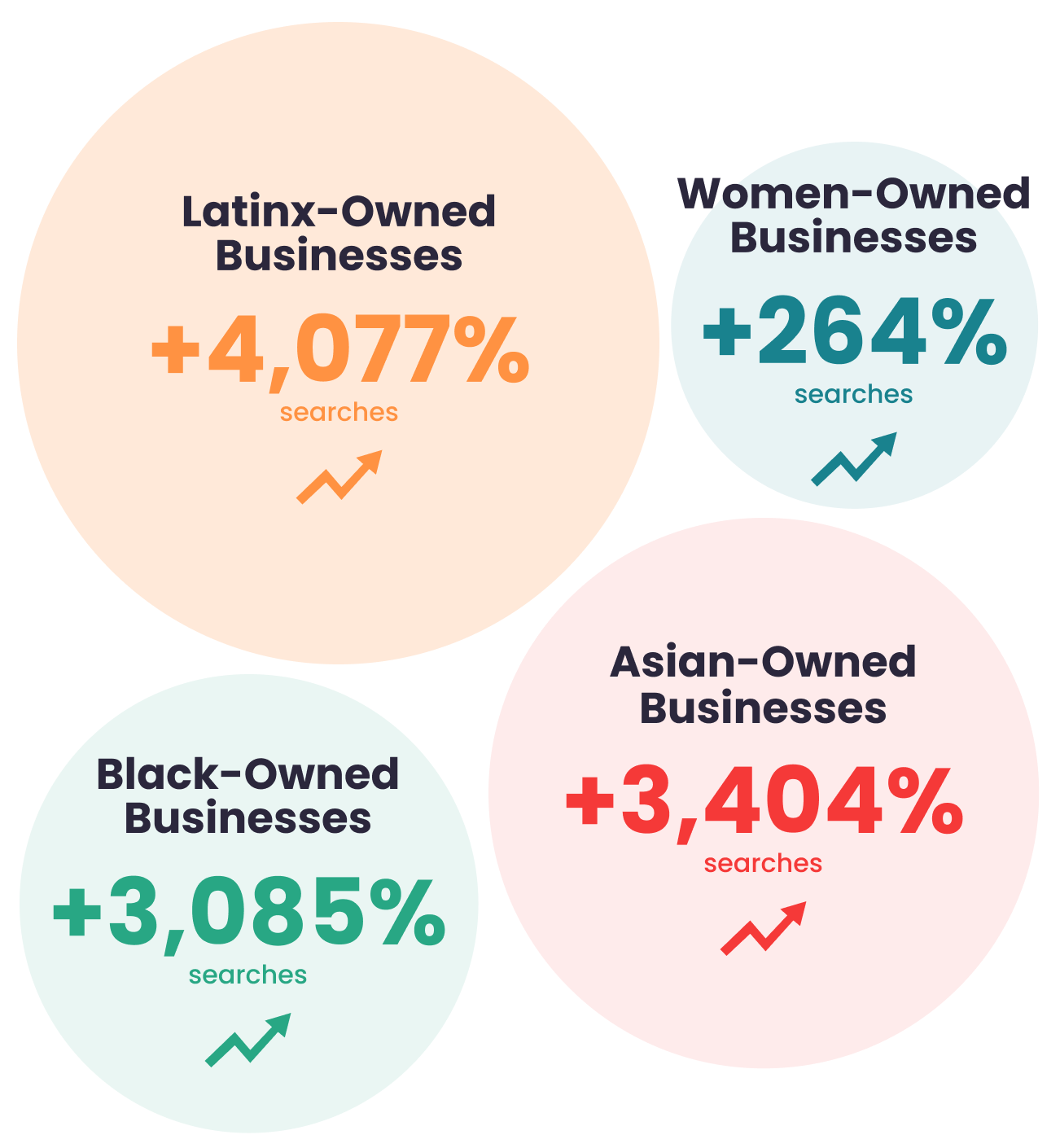

Searches for Black-owned businesses were particularly high in Atlanta—more than twice the average of the top 100 metro areas, as well as Georgia (double the level in the average state). Searches for Latinx-owned businesses were high in several California cities, including the Bakersfield and Modesto metro areas (more than double the average level in the top 100 metros), and across Idaho – 71% higher than in the average state. Searches for women-owned businesses were high in Indiana at nearly double the average and in Grand Rapids, WY at one and a half times the average. Searches for Asian-owned businesses were high in Massachusetts, four times the level in the average state, especially in Boston, where searches were more than three times the average level in the top 100 metros.
Throughout the last year, search volumes were large and growing for restaurants owned by women (up 8,620% Mar. 2020 - Feb. 2021, YoY), for nail (up 1,589%) and hair salons (up 5,762%) owned by Latinx people, for flower shops (up 5,740%) and vegan restaurants (up 2,142%) owned by Black people, and bakeries (up 721%) and coffee shops (up 652%) owned by Asian people.
Based on Yelp’s identity attributes, not only have consumers increasingly sought out Black, Latinx, and women owned businesses they’ve also engaged with many of these businesses more compared to other businesses. The consumer interest – defined by viewing a business page, posting a review or posting a photo – in businesses owned by women, Black, and Latinx proprietors increased in many categories and metro areas after the business owners selected an identity attribute on Yelp.
Women, Black and Latinx-Owned Businesses See Increased Consumer Interest
Consumer interest lifts after business owners indicated an identity attribute on Yelp
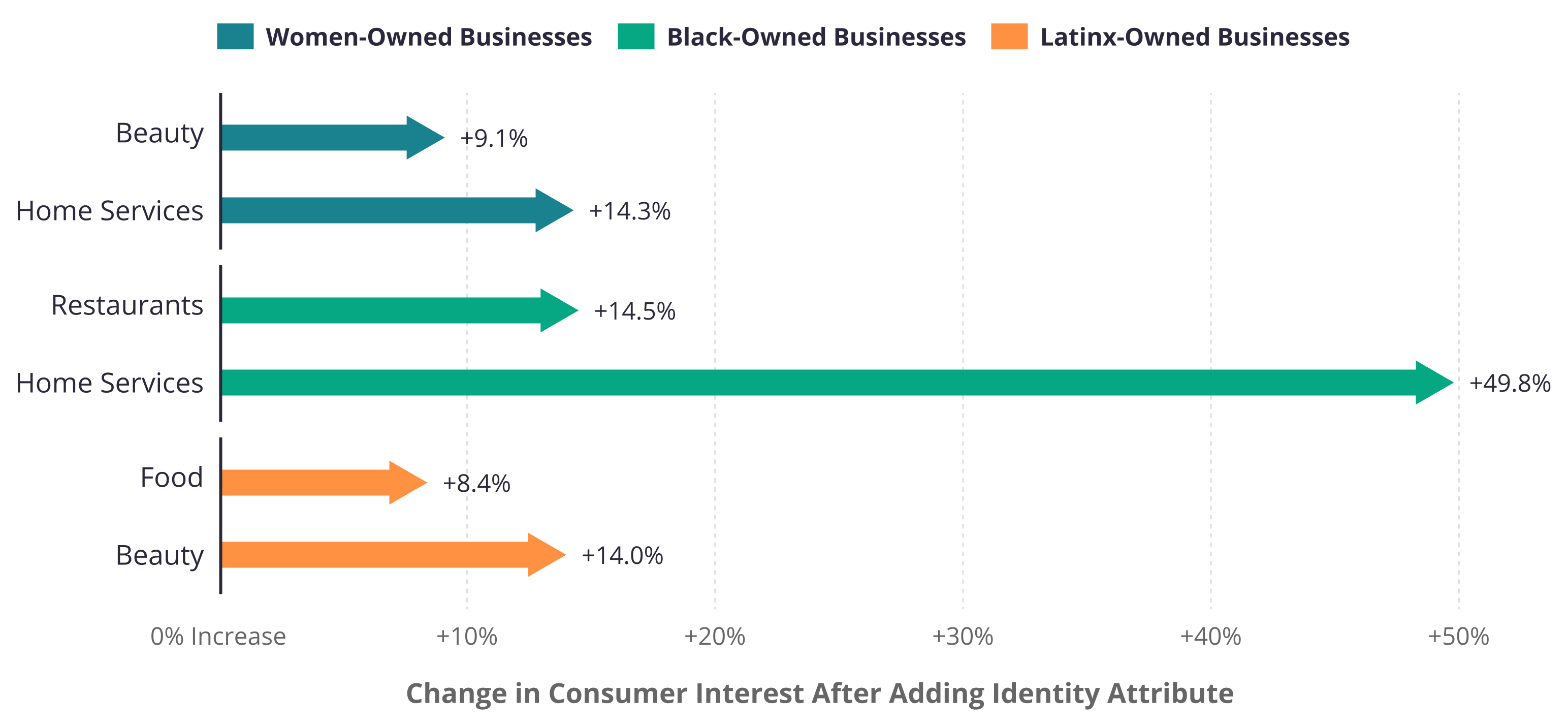
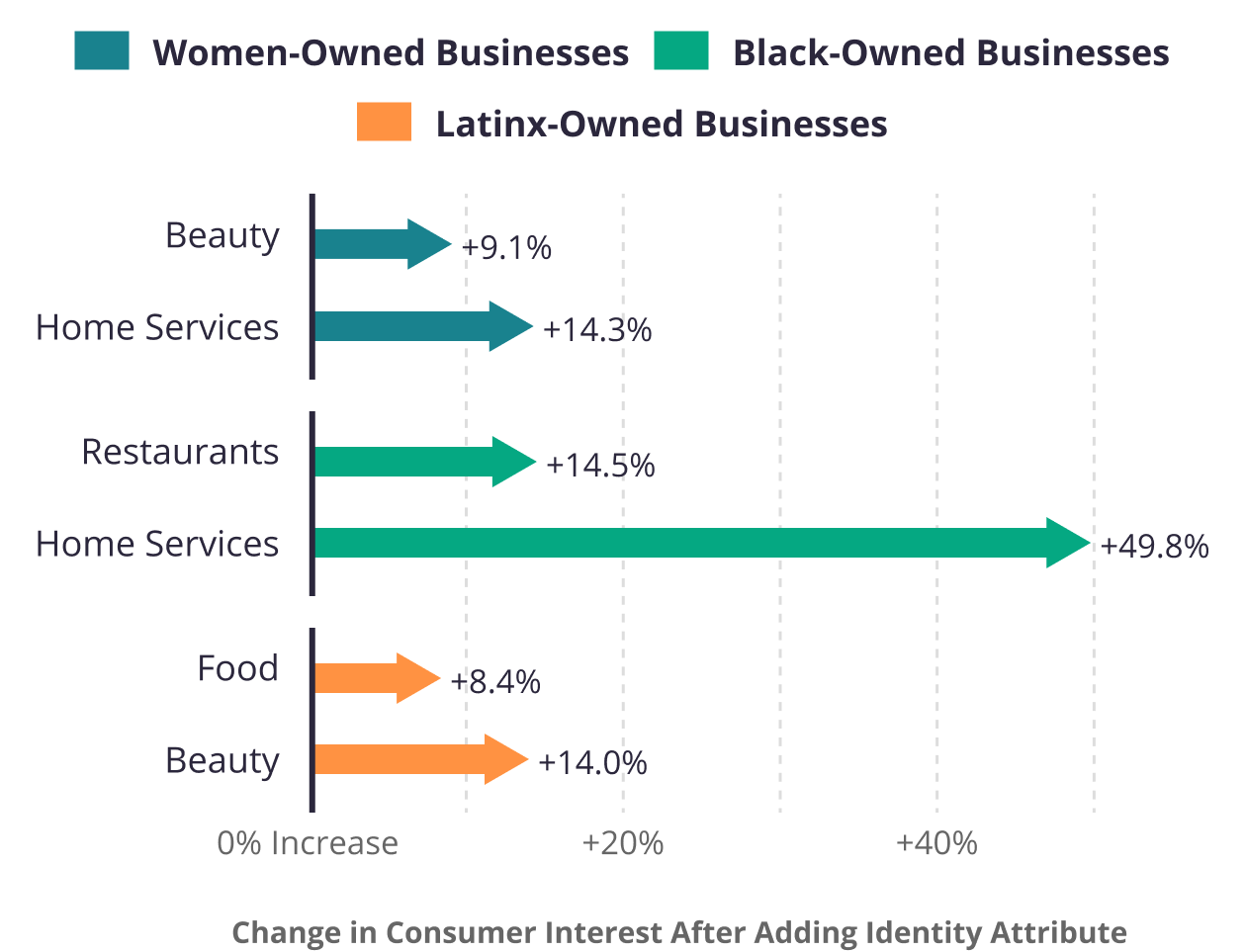

Increased consumer interest was particularly high among Black-owned restaurants and home services businesses in San Francisco and Seattle; among women-owned beauty and home services businesses in Denver and Los Angeles; and among Latinx-owned food and beauty businesses in Boston and San Francisco.
Diverse Businesses’ Are Often Highly Regarded by Consumers and Diverse Business Owners Are More Likely to Respond to Reviews
On average, women, Black people, and Latinx people who own businesses engage with consumers’ feedback on Yelp more often than businesses overall. Consumers also rate many businesses owned by women, Black people, and Latinx people higher than other businesses, but the ratings edge existed prior to when the businesses indicated their identity attributes – demonstrating that the higher rating more likely reflects a great customer service experience than any correlation to the identity attribute(s).
This year, through February, Latinx business owners have responded to reviews at a rate 8% higher than average, Black owners at a 18% higher rate, and women owners at a rate 42% above the norm.
In addition, in 94% of categories with women-owned businesses, the average star rating for the women-owned businesses is higher than the category overall. Black-owned businesses have a higher average star rating than businesses overall in 86% of the categories with Black-owned businesses. In 90% of categories with Latinx-owned businesses, the average star rating is higher for Latinx-owned businesses than other businesses in those categories.
Women, Black and Latinx-Owned Businesses Are Often Highly Regarded by Consumers
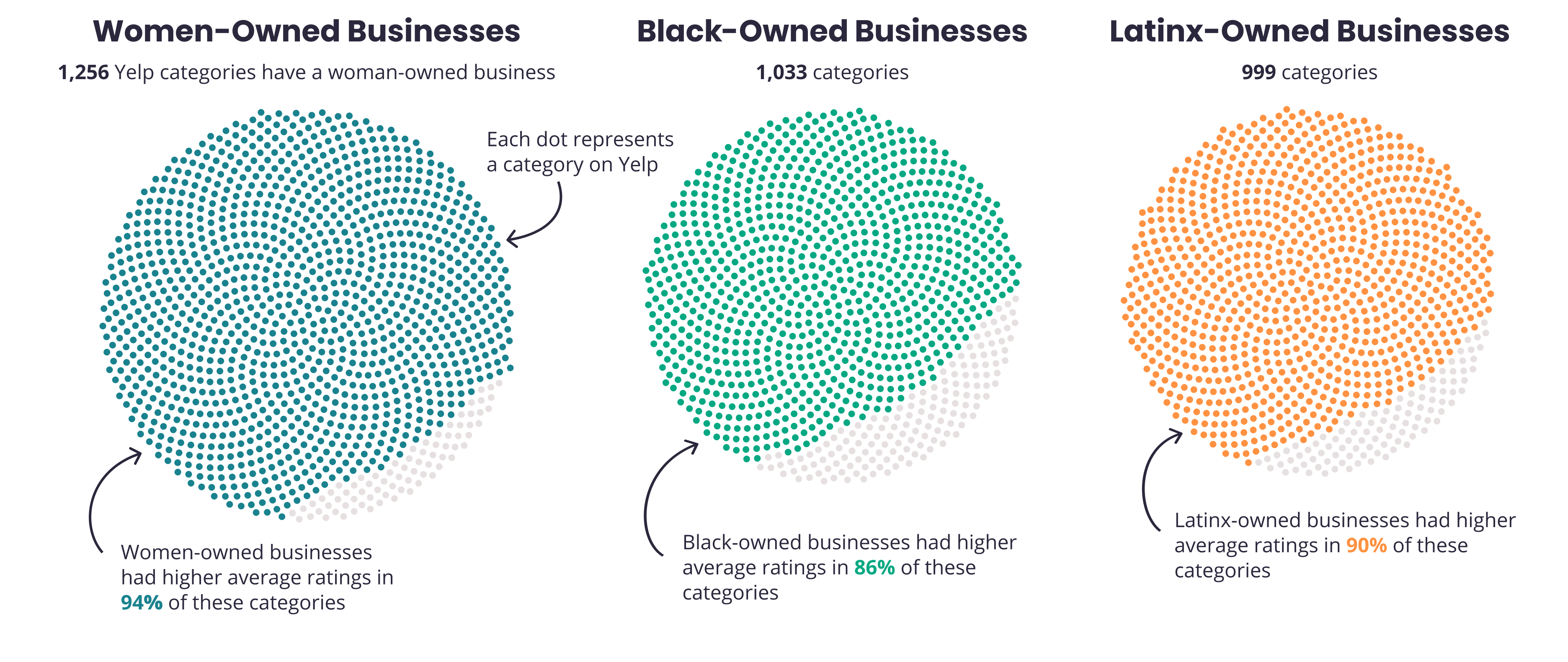


Consumers are Increasingly Likely to Mention Diversity of Business Owners in Reviews
Reviewers increasingly know and care about who owns the business they’re reviewing. Mentions of women owners in reviews rose 76% in February 2021 from a year earlier, mentions of Black business owners increased 195%, and mentions of Latinx owners were up 58%.
Reviewers Are More Aware of a Business’s Ownership
Growth in review mentions of Black, women, and Latinx business owners since February 2020
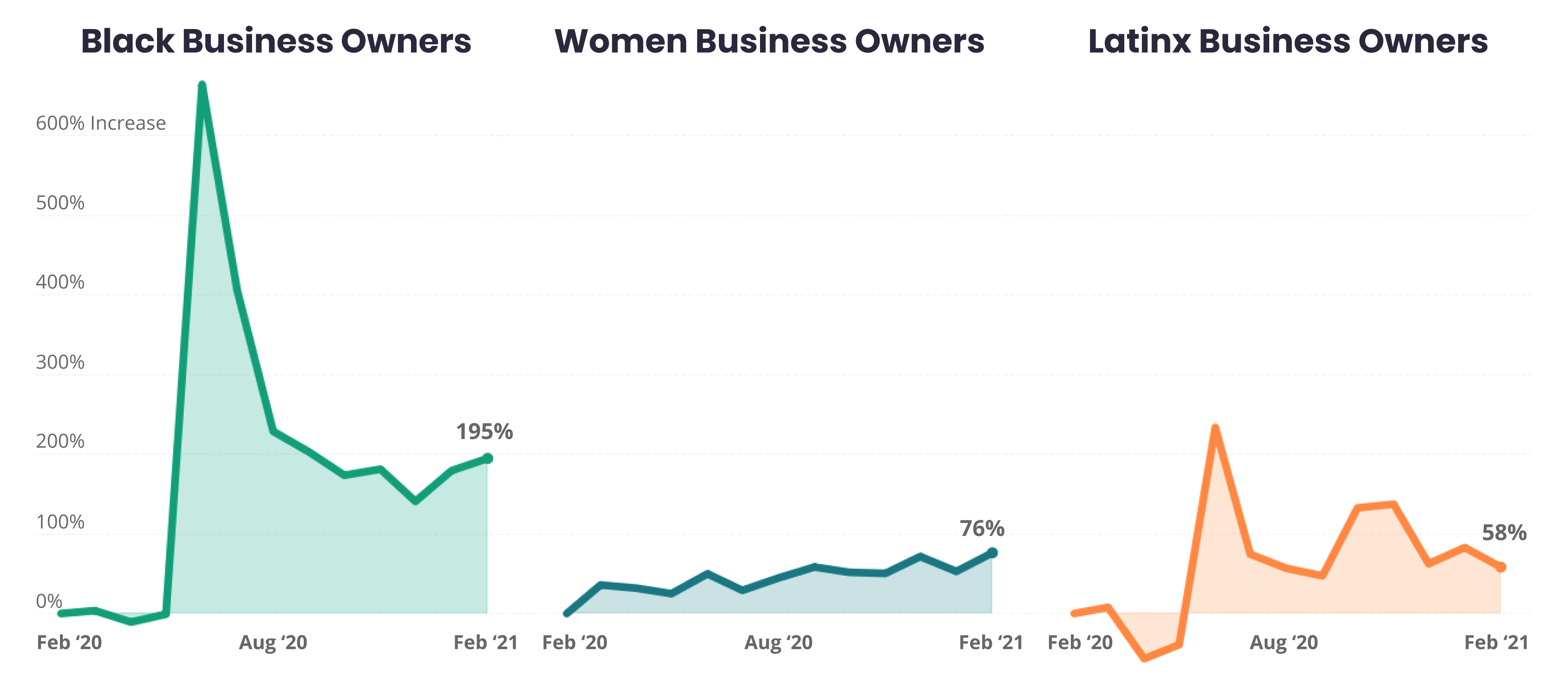
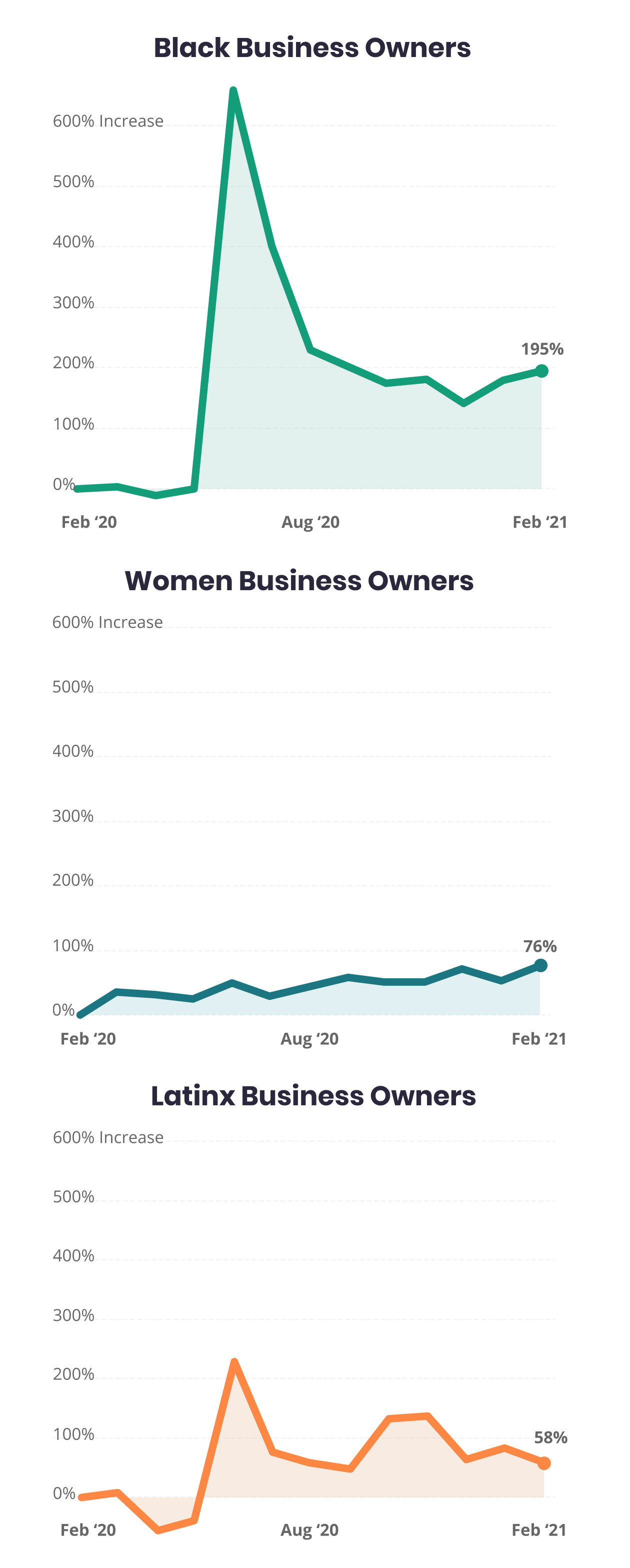

Women, Black, and Latinx Owned Businesses Represent Nearly Every Category Across Yelp
Since launching the women-owned attribute in March 2019, the rate of adoption has remained high: U.S. businesses marked as women-owned have nearly tripled in the past year, from a little more than 80,000 on Jan. 31, 2020, to nearly 240,000 on Feb. 28 this year. More than 1,200 categories, representing nearly every category on Yelp, have a woman-owned business. Since launching the Black-owned attribute in June 2020, nearly 25,000 businesses have adopted the attribute, as of Feb. 28, across more than 1,000 categories on Yelp. Additionally, more than 15,000 businesses have marked themselves as Latinx-owned, the newest identity attribute introduced in September 2020. Nearly 1,000 categories on Yelp have a self-identified, Latinx-owned business.
Diverse Business Owners Serve Large and Small Communities

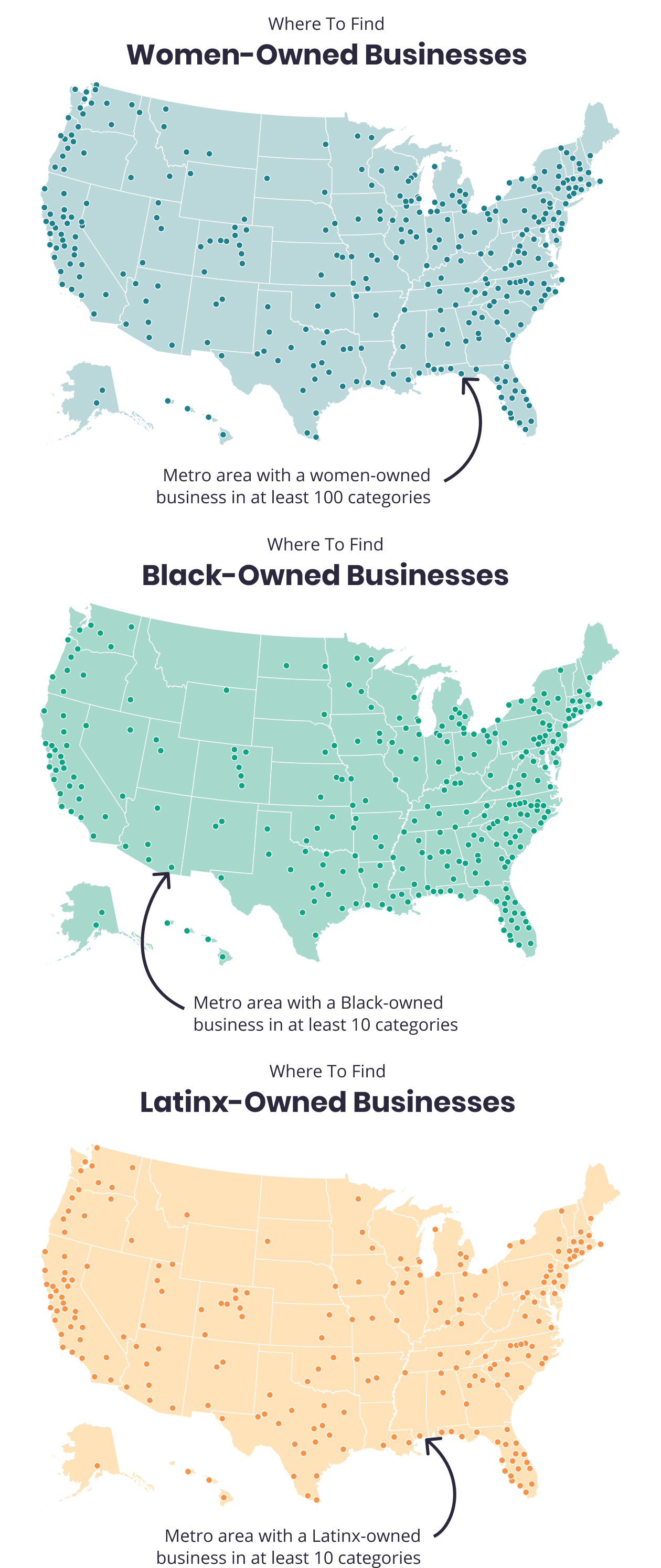

Ownership attributes are not mutually exclusive and business owners can opt into multiple attributes to express their identity. More than 14,000 U.S. businesses are marked as both women-owned and Black-owned across 917 categories, the most popular being home, professional, and local services. Over 7,000 U.S. businesses are marked as both women-owned and Latinx-owned in 878 categories including home services, beauty, and restaurants, and 1,100 U.S. businesses are marked as both Black-owned and Latinx-owned across 526 categories including beauty, home, and local services.
For Black, Latinx, and women business owners, the economic landscape is riddled with significant income disparity, caused by discrimination, inequality and opportunity gaps, creating staggering challenges for underserved business owners; and we know that these hurdles are compounded for women of color. Even through these challenges, it’s heartening to see consumers on Yelp increasingly seeking out and supporting underserved business owners in their communities.
*This data point has been updated after uncovering a typo in the script that produced the YoY increase in searches for Asian-owned businesses for an incorrect month (Feb. 2020). The script has been corrected to produce the YoY increase in searches for Asian-owned businesses for Feb. 2021.
If you'd like additional detail on how the economy is shifting, please contact us at press@yelp.com or join our mailing list to receive an email when new reports are released.
Interested in learning how Yelp data can assist you in developing market insights for your business? Yelp Knowledge can help, learn more here.
Methodology
Identity Attribute Counts by State & Metro Areas
Yelp data tracks when business owners opt into features on their business page. This is the count of businesses that have self-identified as one or more of the following identity attributes: Black-owned, Latinx-owned, and women-owned.
Consumer Searches
We compare the frequency of “identity attribute” words (including “Black owned”, “Latinx owned”, “Women owned”, and “Asian owned”, and similar words) relative to all searches in February 2021 compared to February 2020. For “Asian owned”, Yelp included attribute words that encompass the variety of identities included within Asian community, including, but not limited to: “japanese owned”, “indian owned”, and “korean owned.” Both searches where consumers directly type a search into the search bar and where consumers click on a suggested term or phrase are included.
Consumer Interest Share
Yelp’s consumer interest metric is measured as the count of a few of the many actions consumers take on Yelp, including page views, posting reviews, and posting photos. To measure the impact of adoption of identity attributes on local business, the difference in average consumer interest is measured between total businesses in the category and the selected sample (businesses that opted into an underserved identity attribute), during a specific period after the attribute was selected and the same length of period before the attribute was opted into. For women-owned and Black-owned businesses, June through August compared to October through December, as the attributes were available in March 2019 and June 2020, respectively. For Latinx-owned businesses as the attribute was available in September 2020, November 2020 compared to January 2021.
Business Ratings & Reviews
Yelp data on ratings and reviews are filtered for businesses, with at least one review, owned by underserved communities.
Response to Reviews and Review Mentions
To compare response rates across business owners, Yelp first calculates the average rate of review response for businesses during a specified time period. Then we calculate the response rate from business owners self-identified as Black-owned, Latinx-owned, and/or women-owned.
Review mentions of Black-owned, Latinx-owned, and women-owned are counted in February 2021 and compared to the same period in 2020.
Reopenings
On each date, starting with March 1, we count U.S. businesses that were temporarily closed and reopened through February 28, 2021. This includes only businesses that were open at the start of the pandemic and that closed and reopened at least once. A reopening is of a temporary closure, whether by using Yelp’s temporary closure feature or by editing hours, excluding closures due to holidays. Each reopened business is counted at most once, on the date of its most recent reopening.
Reopenings are based on when they're indicated on Yelp, as such, the data may lag slightly from the true opening or reopening date due to a delay in reporting from consumers and business owners.
Downloadable static graphics can be found here.
See Yelp's previous Coronavirus Economic Impact Reports at our Data Science Medium, Locally Optimal.


